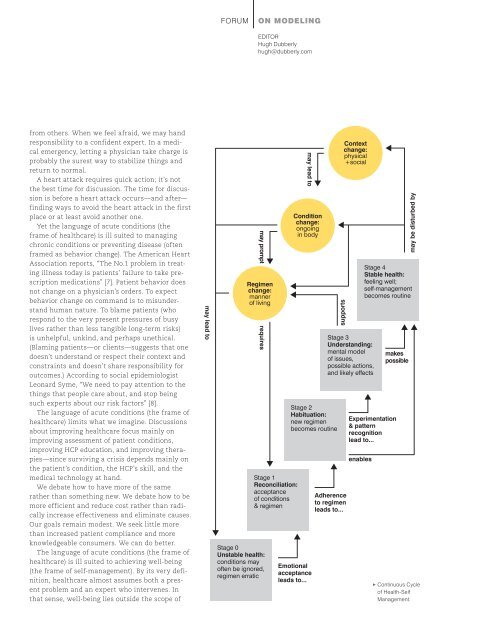interactions
5-27-10Reframing_Health
5-27-10Reframing_Health
You also want an ePaper? Increase the reach of your titles
YUMPU automatically turns print PDFs into web optimized ePapers that Google loves.
FORUM<br />
ON MODELING<br />
EDITOR<br />
Hugh Dubberly<br />
hugh@dubberly.com<br />
from others. When we feel afraid, we may hand<br />
responsibility to a confident expert. In a medical<br />
emergency, letting a physician take charge is<br />
probably the surest way to stabilize things and<br />
return to normal.<br />
A heart attack requires quick action; it’s not<br />
the best time for discussion. The time for discussion<br />
is before a heart attack occurs—and after—<br />
finding ways to avoid the heart attack in the first<br />
place or at least avoid another one.<br />
Yet the language of acute conditions (the<br />
frame of healthcare) is ill suited to managing<br />
chronic conditions or preventing disease (often<br />
framed as behavior change). The American Heart<br />
Association reports, “The No.1 problem in treating<br />
illness today is patients’ failure to take prescription<br />
medications” [7]. Patient behavior does<br />
not change on a physician’s orders. To expect<br />
behavior change on command is to misunderstand<br />
human nature. To blame patients (who<br />
respond to the very present pressures of busy<br />
lives rather than less tangible long-term risks)<br />
is unhelpful, unkind, and perhaps unethical.<br />
(Blaming patients—or clients—suggests that one<br />
doesn’t understand or respect their context and<br />
constraints and doesn’t share responsibility for<br />
outcomes.) According to social epidemiologist<br />
Leonard Syme, “We need to pay attention to the<br />
things that people care about, and stop being<br />
such experts about our risk factors” [8].<br />
The language of acute conditions (the frame of<br />
healthcare) limits what we imagine. Discussions<br />
about improving healthcare focus mainly on<br />
improving assessment of patient conditions,<br />
improving HCP education, and improving therapies—since<br />
surviving a crisis depends mainly on<br />
the patient’s condition, the HCP’s skill, and the<br />
medical technology at hand.<br />
We debate how to have more of the same<br />
rather than something new. We debate how to be<br />
more efficient and reduce cost rather than radically<br />
increase effectiveness and eliminate causes.<br />
Our goals remain modest. We seek little more<br />
than increased patient compliance and more<br />
knowledgeable consumers. We can do better.<br />
The language of acute conditions (the frame of<br />
healthcare) is ill suited to achieving well-being<br />
(the frame of self-management). By its very definition,<br />
healthcare almost assumes both a present<br />
problem and an expert who intervenes. In<br />
that sense, well-being lies outside the scope of<br />
may lead to<br />
may prompt<br />
Regimen<br />
change:<br />
manner<br />
of living<br />
requires<br />
Stage 0<br />
Unstable health:<br />
conditions may<br />
often be ignored,<br />
regimen erratic<br />
Stage 1<br />
Reconciliation:<br />
acceptance<br />
of conditions<br />
& regimen<br />
may lead to<br />
Condition<br />
change:<br />
ongoing<br />
in body<br />
Stage 2<br />
Habituation:<br />
new regimen<br />
becomes routine<br />
Emotional<br />
acceptance<br />
leads to...<br />
supports<br />
Context<br />
change:<br />
physical<br />
+social<br />
Stage 3<br />
Understanding:<br />
mental model<br />
of issues,<br />
possible actions,<br />
and likely effects<br />
Adherence<br />
to regimen<br />
leads to...<br />
Stage 4<br />
Stable health:<br />
feeling well;<br />
self-management<br />
becomes routine<br />
Experimentation<br />
& pattern<br />
recognition<br />
lead to...<br />
enables<br />
makes<br />
possible<br />
may be disturbed by<br />
• Continuous Cycle<br />
of Health-Self<br />
Management.


